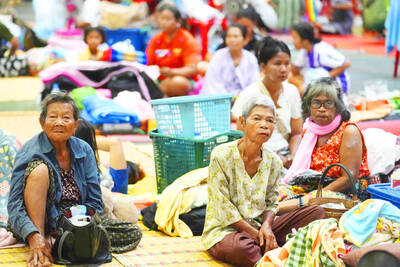Zimbabwe’s beaten down opposition may end up being forced to accept what it swears is unacceptable — a power-sharing deal with Zimbabwean President Robert Mugabe.
Some say it would only prolong Zimbabwe’s agony, while others see a coalition — perhaps with Mugabe as president and opposition leader Morgan Tsvangirai as prime minister or vice president — as the only way to lead the nation out of the current impasse and begin reversing its economic collapse.
South African President Thabo Mbeki, appointed by the main regional bloc to mediate between Mugabe and Tsvangirai, has said some form of coalition is the goal of talks that got off to a tentative start in South Africa on July 10.
On Friday, the opposition applauded plans announced for Mbeki to work closely with the UN and the African Union as he attempts to mediate, saying that this satisfies its demand that Mbeki be joined by another mediator. The opposition had accused Mbeki of favoring Mugabe.
George Sibotshiwe, a spokesman for Tsvangirai’s Movement for Democratic Change, said Friday’s announcement could open the way to an agreement in coming days on a framework for power-sharing talks.
Mugabe and his ZANU-PF party remain adamant that he is Zimbabwe’s duly elected leader, even if most of the rest of the world says a June 27 presidential runoff in which he claimed victory over Tsvangirai was a sham.
More ominously, Mugabe’s military chiefs say their allegiance is only to Mugabe.
A dramatic intervention by the outside world looks unlikely. On July 11, Russia and China delivered a rare twin veto of a US-sponsored UN Security Council resolution that would have imposed sanctions on Mugabe and his top aides. The aim was to punish them for allegedly overseeing political violence and fraud, and to force them to negotiate.
ZANU-PF has said it’s open to power-sharing — as long as Mugabe heads any coalition. The opposition has said it’s open to a “government of national healing,” but only with moderate ZANU-PF members, not Mugabe.
Davie Malungisa, director of the Institute for a Democratic Alternative for Zimbabwe, an independent Harare-based group, described Tsvangirai’s objection to Mugabe as a negotiating position.
“When you are getting into bargaining ... you start from very high,” Malungisa said in a telephone interview from Zimbabwe. “It’s a matter of who blinks first.”
Malungisa said agreeing to govern alongside a man accused of torturing and killing dissidents “would be suicidal,” because Mugabe could betray Tsvangirai.

FOREST SITE: A rescue helicopter spotted the burning fuselage of the plane in a forested area, with rescue personnel saying they saw no evidence of survivors A passenger plane carrying nearly 50 people crashed yesterday in a remote spot in Russia’s far eastern region of Amur, with no immediate signs of survivors, authorities said. The aircraft, a twin-propeller Antonov-24 operated by Angara Airlines, was headed to the town of Tynda from the city of Blagoveshchensk when it disappeared from radar at about 1pm. A rescue helicopter later spotted the burning fuselage of the plane on a forested mountain slope about 16km from Tynda. Videos published by Russian investigators showed what appeared to be columns of smoke billowing from the wreckage of the plane in a dense, forested area. Rescuers in

‘ARBITRARY’ CASE: Former DR Congo president Joseph Kabila has maintained his innocence and called the country’s courts an instrument of oppression Former Democratic Republic of the Congo (DR Congo) president Joseph Kabila went on trial in absentia on Friday on charges including treason over alleged support for Rwanda-backed militants, an AFP reporter at the court said. Kabila, who has lived outside the DR Congo for two years, stands accused at a military court of plotting to overthrow the government of Congolese President Felix Tshisekedi — a charge that could yield a death sentence. He also faces charges including homicide, torture and rape linked to the anti-government force M23, the charge sheet said. Other charges include “taking part in an insurrection movement,” “crime against the

POINTING FINGERS: The two countries have accused each other of firing first, with Bangkok accusing Phnom Penh of targeting civilian infrastructure, including a hospital Thai acting Prime Minister Phumtham Wechayachai yesterday warned that cross-border clashes with Cambodia that have uprooted more than 130,000 people “could develop into war,” as the countries traded deadly strikes for a second day. A long-running border dispute erupted into intense fighting with jets, artillery, tanks and ground troops on Thursday, and the UN Security Council was set to hold an emergency meeting on the crisis yesterday. A steady thump of artillery strikes could be heard from the Cambodian side of the border, where the province of Oddar Meanchey reported that one civilian — a 70-year-old man — had been killed and

Philippine President Ferdinand Marcos Jr is to meet US President Donald Trump this week, hoping Manila’s status as a key Asian ally would secure a more favorable trade deal before the deadline on Friday next week. Marcos would be the first Southeast Asian leader to meet Trump in his second term. Trump has already struck trade deals with two of Manila’s regional partners, Vietnam and Indonesia, driving tough bargains in trade talks even with close allies that Washington needs to keep onside in its strategic rivalry with China. “I expect our discussions to focus on security and defense, of course, but also